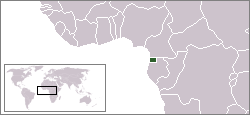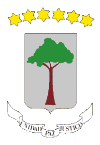Equatorial Guinea
|
|
The Republic of Equatorial Guinea is a nation in central Africa, and one of the smallest countries in continental Africa. It borders Cameroon on the north, Gabon on the south and east, and the Gulf of Guinea on the west, where the islands of S㯠Tomé ¡nd Pr�ipe lie to its southwest. Formerly the Spanish colony of Spanish Guinea, the country's territory (continentally known as R�Muni) includes a number of islands, including the sizable island of Bioko where the capital, Malabo (formerly Santa Isabel), is located. Its post-independence name is suggestive of its being situated near both the equator and the Gulf of Guinea.
| |||||
| National motto: Unidad, Paz, Justicia (Spanish: (Unity, Peace, Justice) | |||||

| |||||
| Official language | Spanish, French | ||||
| Capital and Largest City | Malabo | ||||
| Capital's coordinates | N 3° 21′ E 8° 40′ | ||||
| President | Teodoro Obiang Nguema Mbasogo | ||||
| Prime Minister | [[Miguel Abia Biteo Boricó|- | Area - Total - % water | Ranked 141st 28,051 km² Negligible | ||
| Population
- Total (July 2004 (http://www.cia.gov/cia/publications/factbook/geos/ek.html)) - Density | Ranked 159th
523,051 18.6/km² | ||||
| GDP (PPP)
- Total (Year) - GDP/head | Ranked 182nd
$1,200 million $2,700 | ||||
| Currency | CFA franc (XAF) | ||||
| Time zone | UTC +1 | ||||
| Independence - Date | From Spain October 12, 1968 | ||||
| National anthem | Caminemos pisando la senda | ||||
| Internet TLD | .gq | ||||
| Calling Code | 240 | ||||
| Contents |
Politics
Main article: Politics of Equatorial Guinea
Equatorial Guinea became officially independent from Spain on October 12, 1968. Since then, the country has had two leaders: Francisco Mac� Nguema, the former mayor of Mongomo under the Spanish colonial government, and his nephew Teodoro Obiang Nguema Mbasogo, who staged a military coup d'鴡t, executed his uncle, and has ruled since 1979.
The 1982 constitution of Equatorial Guinea gives Obiang extensive powers, including naming and dismissing members of the cabinet, making laws by decree, dissolving the Chamber of Representatives, negotiating and ratifying treaties and calling legislative elections. Obiang retains his role as commander in chief of the armed forces and minister of defense, and he maintains close supervision of the military activity. The Prime Minister is appointed by the President and operates under powers designated by the President. The Prime Minister coordinates government activities in areas other than foreign affairs, national defense and security.
On December 15, 2002 [1] (http://allafrica.com/stories/200212160112.html), Equatorial Guinea's four main opposition parties withdrew from the country's presidential election. Obiang won an election widely considered fraudulent by members of the western press.
According to a March 2004 BBC profile [2] (http://news.bbc.co.uk/1/hi/world/africa/3516588.stm), politics within the country are currently dominated by tensions between Obiang's son Teodorin, and other close relatives with powerful positions in the security forces. The tension may be rooted in power shift arising from the dramatic increase since 1997 in oil production.
A November 2004 report [3] (http://www.theaustralian.news.com.au/common/story_page/0,5744,11431299%255E2703,00.html) named Mark Thatcher as the financial backer of a March 2004 attempt to topple Obiang organized by Simon Mann.
Economy
Main article: Economy of Equatorial Guinea
Pre-independence Equatorial Guinea counted on cocoa production for hard currency earnings. In 1959 it had the highest per capita income of Africa.
The discovery of large oil reserves in 1996 and its subsequent exploitation have contributed to a dramatic increase in government revenue. As of 2004 [4] (http://www.washingtonpost.com/wp-dyn/articles/A1101-2004Sep6.html), Equatorial Guinea is the third-largest oil producer in Sub-Saharan Africa. Its oil production has risen to 360,000 barrels/day, up from 220,000 only two years earlier.
Forestry, farming, and fishing are also major components of GDP. Subsistence farming predominates. The deterioration of the rural economy under successive brutal regimes has diminished any potential for agriculture-led growth.
Despite a per capita income of more than US$6000 per year, Equatorial Guinea ranks 109th out of 177 on the United Nations Human Development Index.
In July 2004, the U.S. Senate published an investigation into Riggs Bank, a Washington-based bank into which most of Equatorial Guinea's oil revenues were paid until recently, and which also banked for Chile's Augusto Pinochet. The Senate report, as to Equatorial Guinea, showed that at least $35 million were siphoned off by Obiang, his family and senior officials of his regime. The president has denied any wrongdoing. While Riggs Bank in February 2005 paid $9 million as restitution for its banking for Chile's Augusto Pinochet, no restitution was made with regard to Equatorial Guinea, as reported in detail in this Anti-Money Laundering Report from Inner City Press (http://www.innercitypress.org/finwatch.html).
Provinces
Main article: Provinces of Equatorial Guinea Equatorial Guinea is divided into seven provinces:
- Annobó® rovince (provincial capital: [[Palé)
- Bioko Norte Province (Malabo)
- Bioko Sur Province (Luba)
- Centro Sur Province (Evinayong)
- Kiétem Province ([[Ebebiy�])
- Litoral Province (Bata)
- Wele-Nzas Province (Mongomo)
Geography
Main article: Geography of Equatorial Guinea
The Republic of Equatorial Guinea is located in west central Africa. Bioko Island lies about 40 kilometers (25 mi.) from Cameroon. Annobó® sland lies about 595 kilometers (370 mi.) southwest of Bioko Island. The larger continental region of Rio Muni lies between Cameroon and Gabon on the mainland; it includes the islands of Corisco, Elobey Grande, Elobey Chico, and adjacent islets.
History
Main article: History of Equatorial Guinea
The first inhabitants of the region that is now Equatorial Guinea are believed to have been Pygmies, of whom only isolated pockets remain in northern Rio Muni. Bantu migrations between the 17th and 19th centuries brought the coastal tribes and later the Fang. Elements of the latter may have generated the Bubi, who emigrated to Bioko from Cameroon and Rio Muni in several waves and succeeded former neolithic populations. The Annobon population, native to Angola, was introduced by the Portuguese via S⯠Tomé® The Portuguese explorer, Fernando Po (Fern㯠do Poo), seeking a route to India, is credited with having discovered the island of Bioko in 1471. He called it Flor Formosa ("pretty flower"), but it quickly took on the name of its European discoverer. The islands of Fernando Pó¯ ¡nd Annobó® ·ere colonized by the Portuguese in 1474. The Portuguese retained control until 1778, when the island, adjacent islets, and commercial rights to the mainland between the Niger and Ogoue Rivers were ceded to Spain in exchange for territory in South America (Treaty of El Pardo). From 1827 to 1843, Britain established a base on the island to combat the slave trade. The mainland portion, Rio Muni, became a protectorate in 1885 and a colony in 1900. Conflicting claims to the mainland were settled in 1900 by the Treaty of Paris, and periodically, the mainland territories were united administratively under Spanish rule. Between 1926 and 1959 they were united as the colony of Spanish Guinea.
Demographics
Main article: Demographics of Equatorial Guinea
The majority of the people of Equatorial Guinea are of Bantu origin. The largest tribe, the Fang, is indigenous to the mainland, but substantial migration to Bioko Island has resulted in Fang dominance over the earlier Bantu inhabitants. The Fang constitute 80 percent of the population and are themselves divided into 67 clans. Those in the northern part of Rio Muni speak Fang-Ntumu, while those in the south speak Fang-Okah; the two dialects are mutually unintelligible. The Bubi, who constitute 15 percent of the population, are indigenous to Bioko Island.
In addition, there are coastal tribes, sometimes referred to as "Playeros": Ndowes, Bujebas, Balengues, and Bengas on the mainland and small islands, and "Fernandinos", a Creole community, on Bioko. Together, these groups compose five percent of the population. There is a growing number of foreigners from neighboring Cameroon, Nigeria, and Gabon. In 2001, there were about 280 Americans residing in Equatorial Guinea.
Petroleum has contributed to a doubling of the population in Malabo.
Culture
Main article: Culture of Equatorial Guinea
Mass media
The most dominant form of mass media in the country are the three state-operated FM radio stations. There are also five shortwave radio stations.
A July 2003 article from the BBC [5] (http://news.bbc.co.uk/2/hi/africa/3098007.stm) points out there are no newspapers in the country and described how a Fang program called "Bidze-Nduan" ("Bury the Fire") on a widely listened-to state radio station declared that Obiang was "in permanent contact with the Almighty"; a presidential aide on the show also said:
- He (Obiang) can decide to kill without anyone calling him to account and without going to hell because it is God himself, with whom he is in permanent contact, and who gives him this strength.
Some media-related statistics from The World Factbook are summarized in a section on communications in Equatorial Guinea.
Miscellaneous topics
- Communications in Equatorial Guinea
- Transportation in Equatorial Guinea
- Military of Equatorial Guinea
- Foreign relations of Equatorial Guinea
- Eric Moussambani
Reference
- Max Liniger-Goumaz, Small is not Always Beautiful: The Story of Equatorial Guinea (French 1986, translated 1989) ISBN 0-389-20861-2
- Ibrahim K. Sundiata, Equatorial Guinea: Colonialism, State Terror, and the Search for Stability (1990, Boulder: Westview Press)
References
This article incorporates information from The World Factbook, which is in the public domain.
External links
News
- allAfrica - Equatorial Guinea (http://allafrica.com/equatorialguinea/) news headline links
Overviews
- BBC News Country Profile - Equatorial Guinea (http://news.bbc.co.uk/1/hi/world/africa/country_profiles/1023151.stm)
- CIA World Factbook - Equatorial Guinea (http://www.cia.gov/cia/publications/factbook/geos/ek.html)
Directories
- LookSmart - Equatorial Guinea (http://search.looksmart.com/p/browse/us1/us317836/us317916/us559898/us559899/us10065674/us559921/) directory category
- Open Directory Project - Equatorial Guinea (http://dmoz.org/Regional/Africa/Equatorial_Guinea/) directory category
- Stanford University - Africa South of the Sahara: Equatorial Guinea (http://www-sul.stanford.edu/depts/ssrg/africa/eqg.html) directory category
- The Index on Africa - Equatorial Guinea (http://www.afrika.no/index/Countries/Equatorial_Guinea/)
- University of Pennsylvania - African Studies Center: Equitorial Guinea (http://www.sas.upenn.edu/African_Studies/Country_Specific/Eq_Guinea.html) directory category
- Yahoo! - Equitorial Guinea (http://dir.yahoo.com/Regional/Countries/Equatorial_Guinea/) directory category
Tourism
Other
- Equatorial Guinea Banking Issues, from the Fair Finance Watch (http://www.fairfinancewatch.org/africa.html#obiang)
| Countries in Africa | ||
|
Algeria | Angola | Benin | Botswana | Burkina Faso | Burundi | Cameroon | Cape Verde | Central African Republic | Chad | Comoros | Democratic Republic of the Congo | Republic of the Congo | Côte d'Ivoire | Djibouti | Egypt | Equatorial Guinea | Eritrea | Ethiopia | Gabon | The Gambia | Ghana | Guinea | Guinea-Bissau | Kenya | Lesotho | Liberia | Libya | Madagascar | Malawi | Mali | Mauritania | Mauritius | Morocco | Mozambique | Namibia | Niger | Nigeria | Rwanda | São Tomé and Príncipe | Senegal | Seychelles | Sierra Leone | Somalia | Somaliland | South Africa | Sudan | Swaziland | Tanzania | Togo | Tunisia | Uganda | Zambia | Zimbabwe | Western Sahara | ||
| Dependencies: Canary Islands | Ceuta and Melilla | Madeira Islands | Mayotte | Réunion | Saint Helena and dependencies | ||


